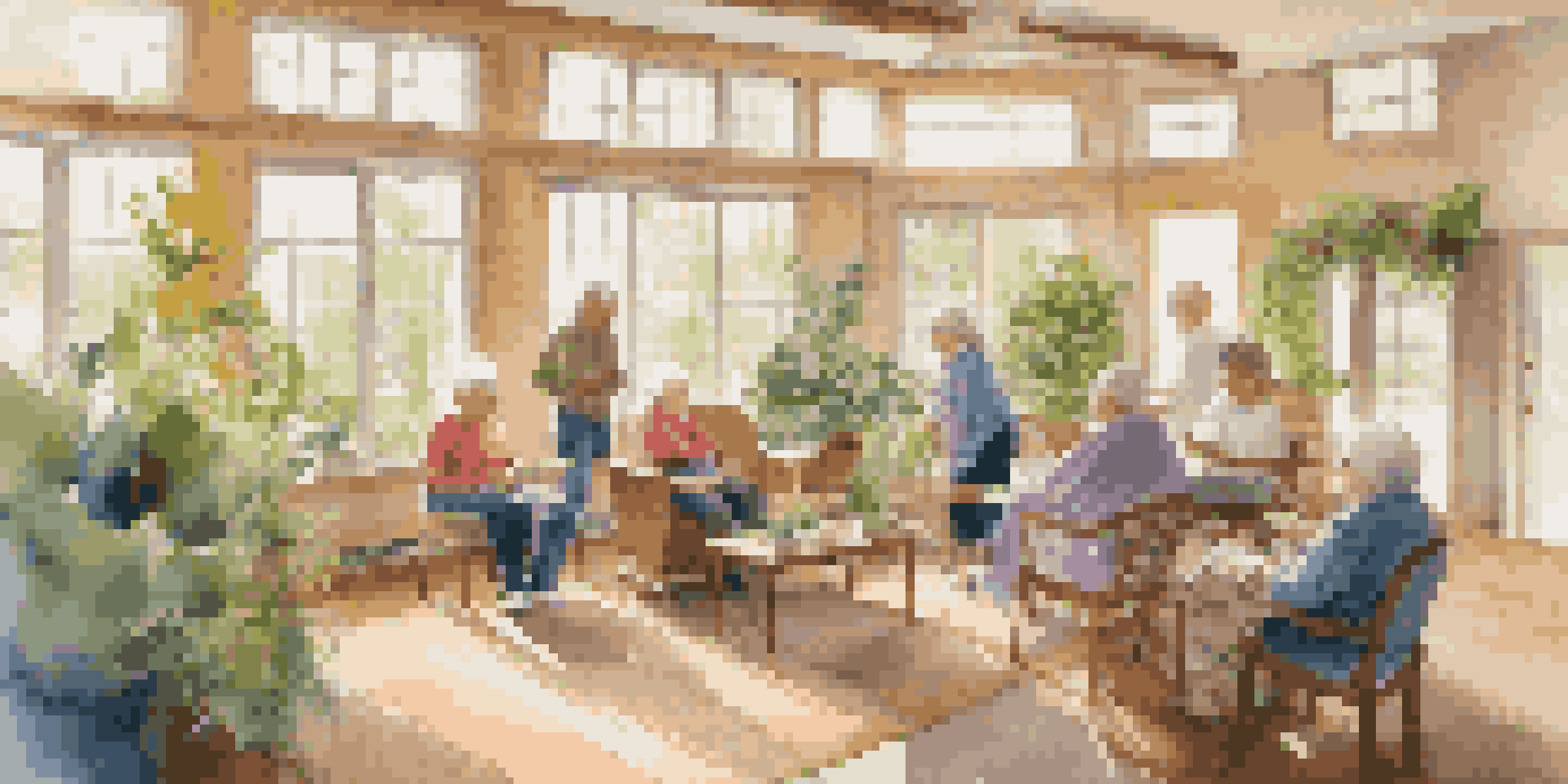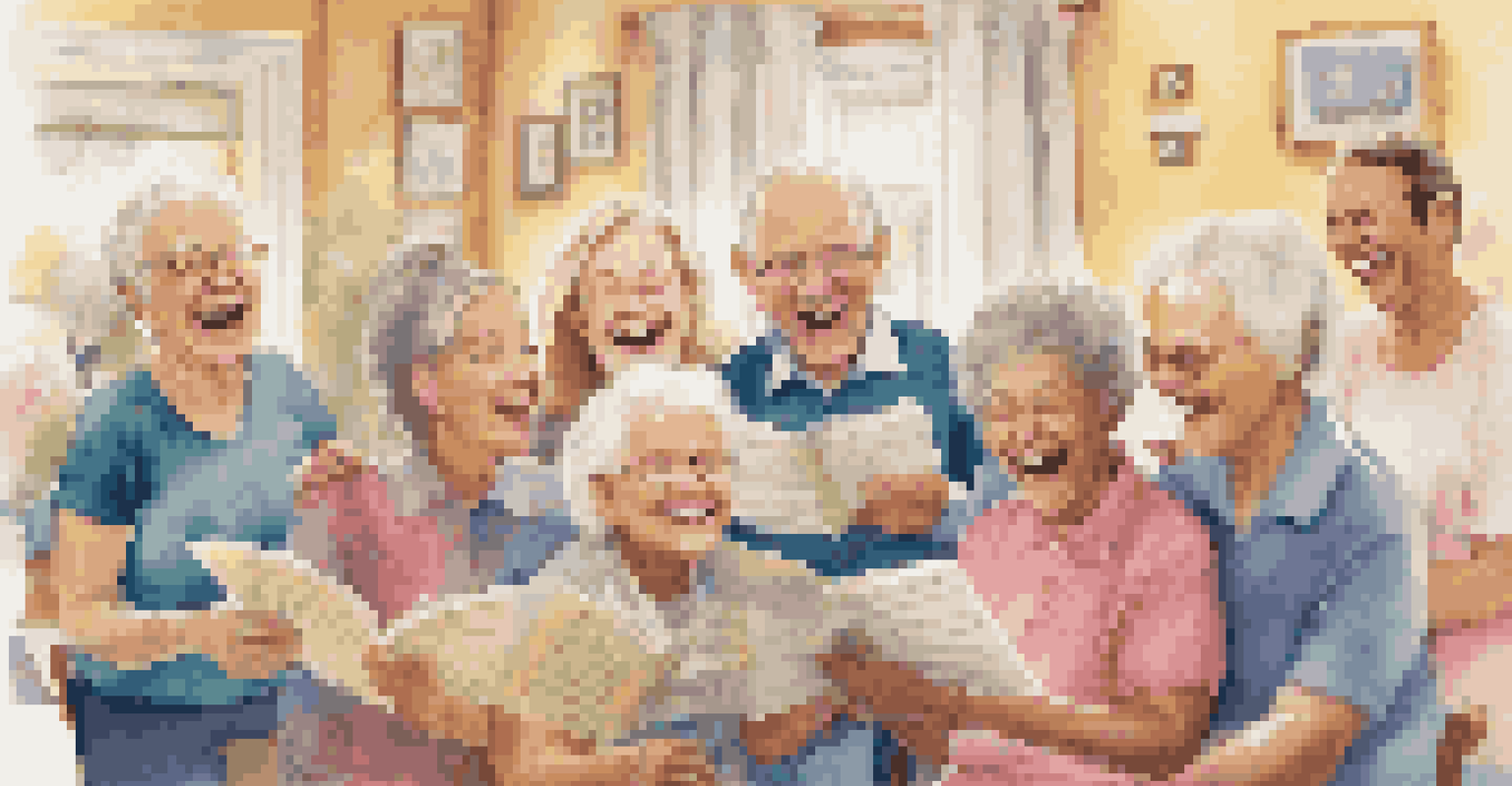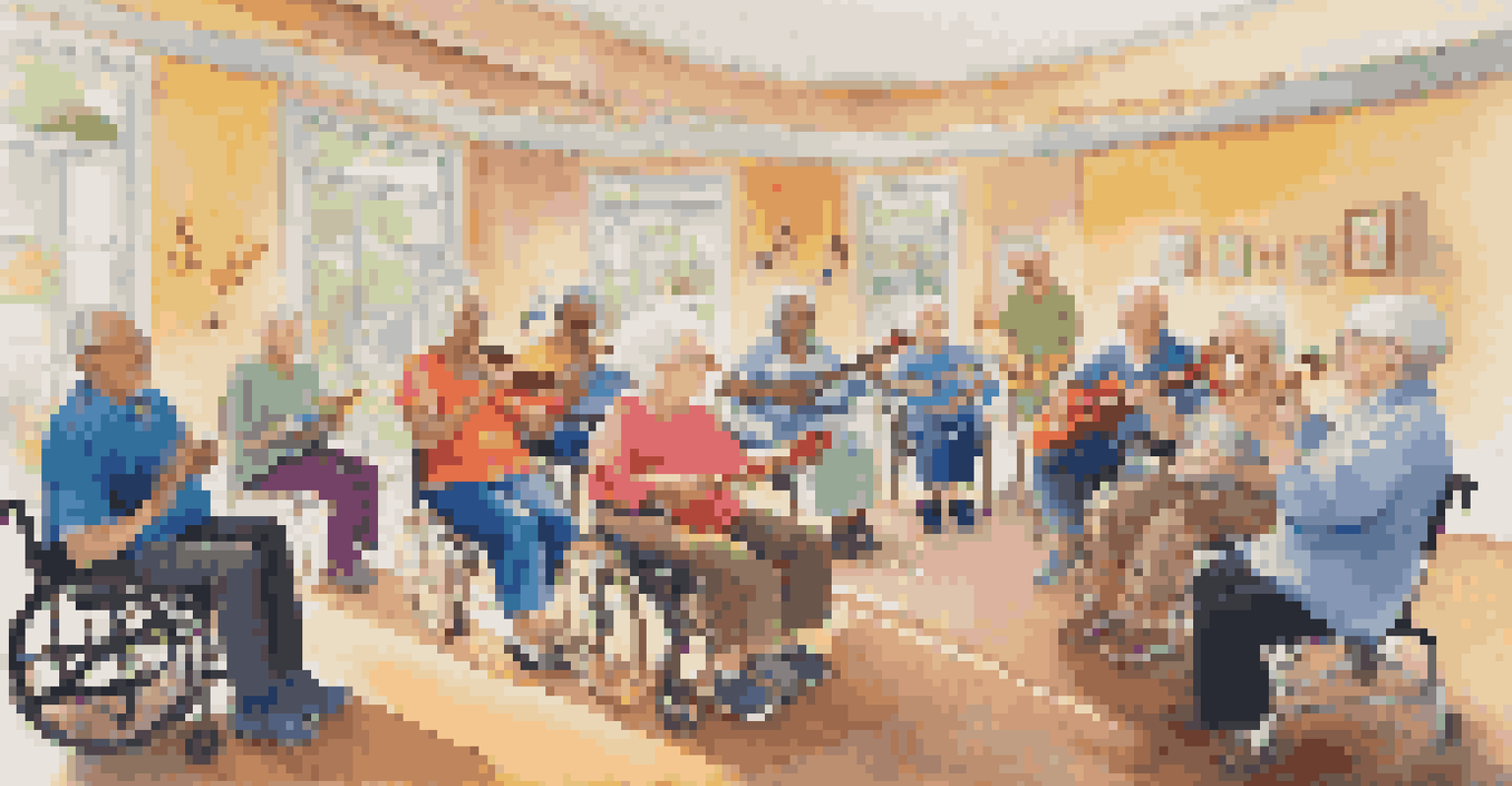Using Music to Enhance Communication in Nursing Homes

The Role of Music in Communication for Seniors
Music serves as a powerful tool for communication, especially in nursing homes where traditional verbal exchanges may be challenging. For many seniors, music evokes memories and emotions, bridging gaps in communication caused by cognitive decline. With familiar songs, caregivers can connect with residents on a deeper level, fostering emotional responses that words sometimes cannot express.
Music can change the world because it can change people.
Imagine a resident who struggles to articulate feelings or memories. When a caregiver plays a cherished tune from their youth, it can spark joy, prompting smiles or even stories that might have been locked away. This interaction not only enhances communication but also enriches the resident's quality of life, creating a more engaging environment.
Moreover, music can serve as a non-verbal cue that resonates with seniors, making them feel understood and valued. The rhythm and melodies can help convey emotions that might be difficult to put into words, thus enhancing the overall communicative experience in nursing homes.
Benefits of Music Therapy in Nursing Homes
Music therapy is an established practice in nursing homes that offers numerous benefits. It involves the use of music interventions to achieve specific therapeutic goals, such as improving communication skills and reducing anxiety. For many residents, participating in music therapy can lead to increased verbal engagement and social interaction with both peers and staff.

In addition to communication, music therapy can also improve cognitive function and memory recall. For instance, a simple sing-along session can stimulate brain activity, allowing residents to remember lyrics or melodies, which can be incredibly rewarding. This not only boosts their confidence but also encourages them to participate more actively in social settings.
Music Enhances Senior Communication
Music serves as a vital tool for seniors, helping to bridge communication gaps caused by cognitive decline and evoking emotions and memories.
Furthermore, music therapy can create a sense of community among residents. Shared musical experiences foster connections, making it easier for individuals to bond over their favorite songs, ultimately reducing feelings of loneliness and isolation.
Creating a Music-Friendly Environment
To effectively use music in nursing homes, it's essential to create a music-friendly environment. This involves assessing residents' musical preferences and curating playlists that resonate with them. A personalized approach ensures that the music played will elicit positive responses, encouraging residents to engage and communicate.
Where words fail, music speaks.
Incorporating live music sessions can also enhance the atmosphere. Local musicians or even staff members can perform, creating an interactive experience that invites residents to sing along or dance. This not only provides entertainment but also promotes social interaction, which is vital for emotional well-being.
Additionally, designating specific times for musical activities can help residents anticipate and look forward to these moments. Such routines can create a sense of stability and joy, making communication through music a regular part of their lives.
Using Music to Alleviate Communication Barriers
Communication barriers in nursing homes can arise from various factors, including cognitive impairments and hearing loss. Music can help alleviate these challenges by providing an alternative medium for expression. For example, even if a resident struggles with speech, they may be able to hum a tune or tap along to the rhythm, effectively communicating their feelings.
Moreover, familiar melodies can trigger emotional responses that facilitate non-verbal communication. A smile or a nod in response to a favorite song can convey feelings of happiness and connection without the need for words. This aspect of music allows residents to express themselves, even when traditional communication methods fail.
Music Therapy Benefits Residents
Engaging in music therapy can improve communication skills, cognitive function, and foster social connections among nursing home residents.
Additionally, caregivers can use music as a tool to soothe and calm residents who may feel anxious or agitated. Soft, calming melodies can create a peaceful environment, promoting relaxation and opening up pathways for more effective communication.
Engaging Families through Music in Nursing Homes
Involving family members in musical activities can significantly enhance communication in nursing homes. Music offers a shared experience that can strengthen bonds between residents and their families. For instance, family sing-alongs during visits can create joyful memories, making communication more meaningful.
Additionally, caregivers can encourage families to share their loved ones' favorite songs or genres. This not only personalizes the music experience but also invites families to participate in their loved one’s care. When families see their loved ones enjoying and engaging with music, it fosters a sense of relief and connection.
Furthermore, organizing music-themed events can create opportunities for families to interact with residents and staff. These gatherings encourage open dialogue, making communication less intimidating and more enjoyable for everyone involved.
Overcoming Resistance to Musical Engagement
Some residents may initially resist musical engagement due to personal preferences or past experiences. It’s essential to approach this with patience and understanding, allowing residents to express their feelings about music. By doing so, caregivers can identify specific genres or artists that might resonate more positively with them.
Gradually introducing music in low-pressure situations can help ease any resistance. For example, playing soft background music during meals might create a more relaxed environment that encourages residents to engage without feeling overwhelmed. Over time, they may become more open to participating in more active musical activities.
Creating a Music-Friendly Environment
Establishing a music-friendly atmosphere with personalized playlists and live sessions encourages resident engagement and overall well-being.
Moreover, celebrating small victories, such as a resident tapping their foot or humming along, can reinforce positive associations with music. This gentle encouragement can help build confidence and excitement about musical engagement, leading to more effective communication.
Future Trends in Music and Nursing Home Communication
As technology continues to advance, the future of using music in nursing homes looks promising. Innovations such as music apps and virtual reality experiences can further enhance communication opportunities for residents. These tools allow for personalized music experiences that cater to individual preferences and needs.
Moreover, ongoing research into the impact of music on cognitive and emotional health will likely shape how facilities implement musical programs. By staying informed about new findings, nursing homes can adopt evidence-based practices that optimize the benefits of music for communication.

Finally, fostering collaborations with music therapists and local artists can lead to more dynamic and engaging musical experiences. Such partnerships can enrich the cultural fabric of nursing homes, ensuring that communication through music remains a vital and evolving aspect of care.